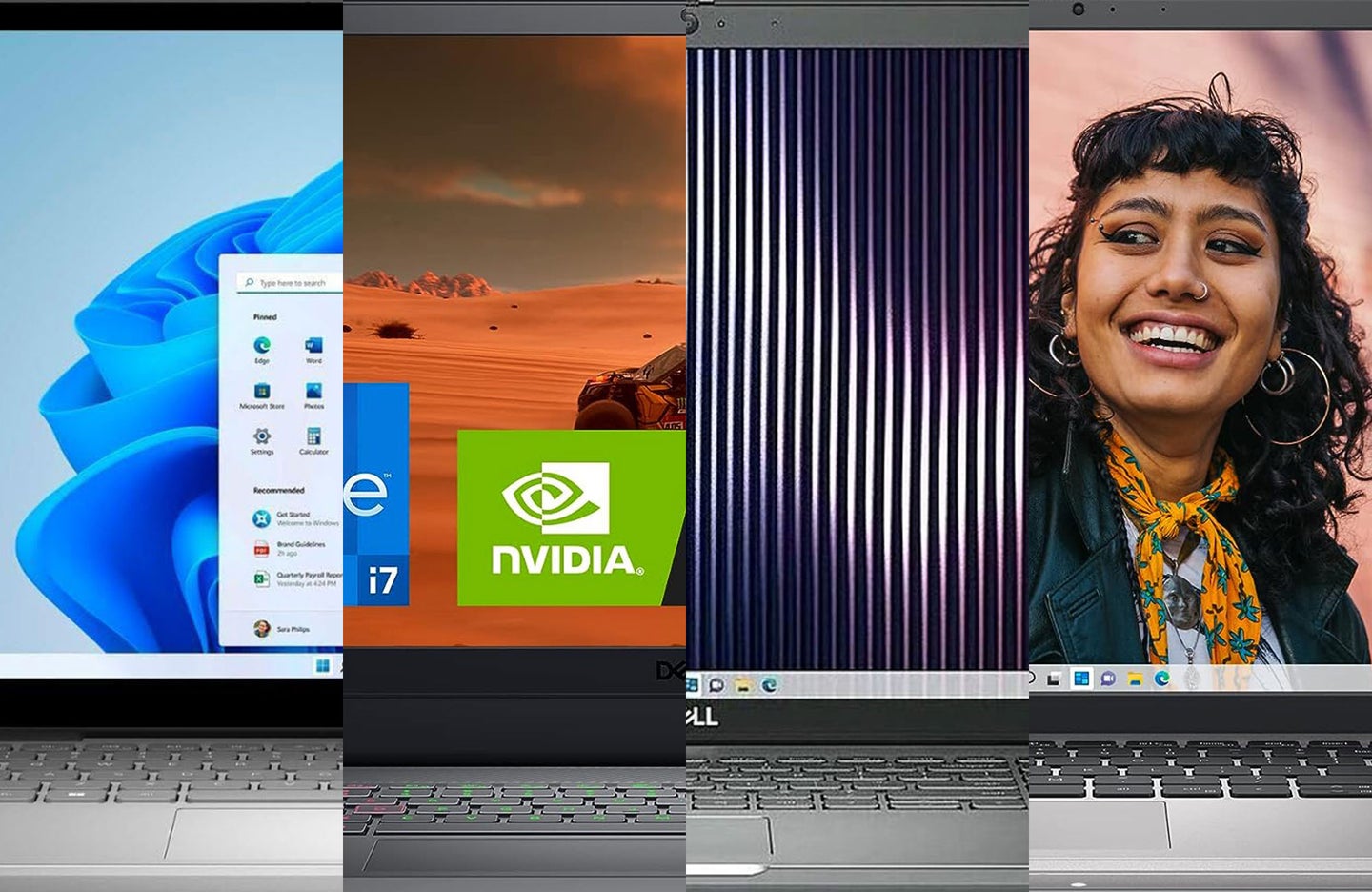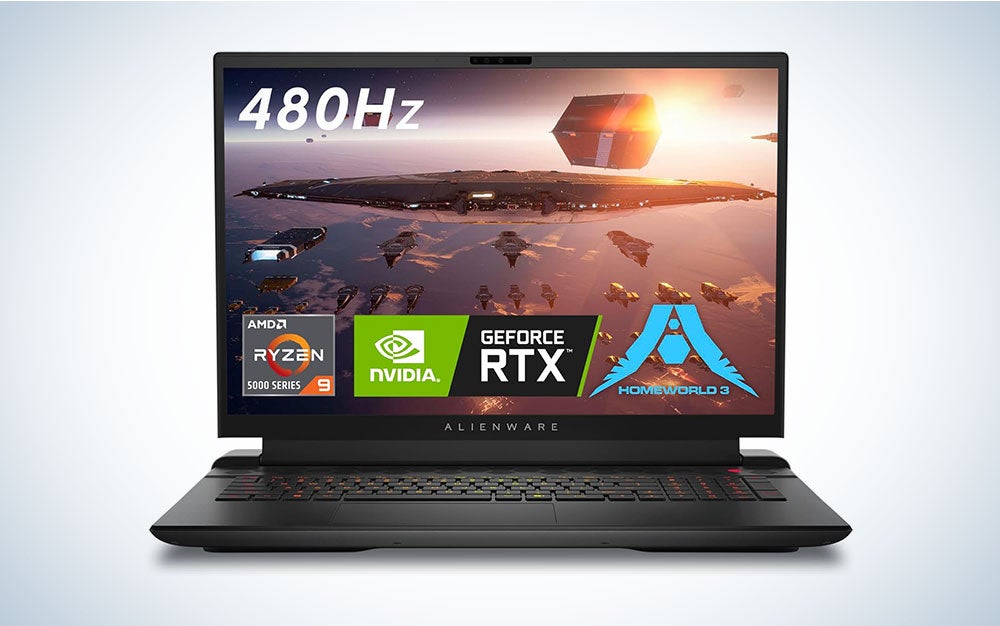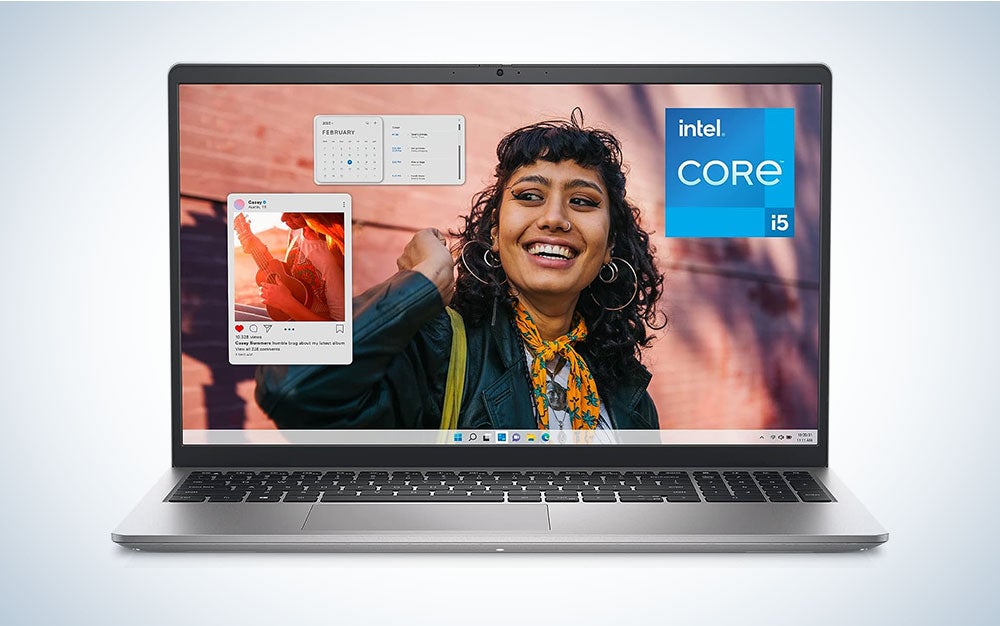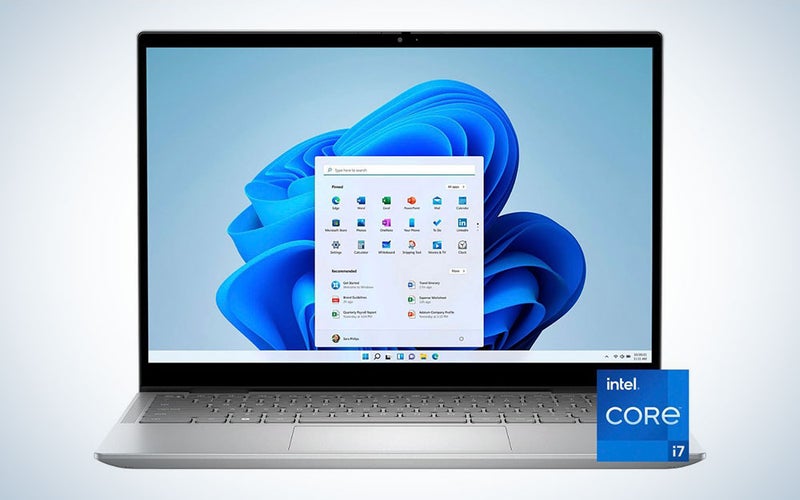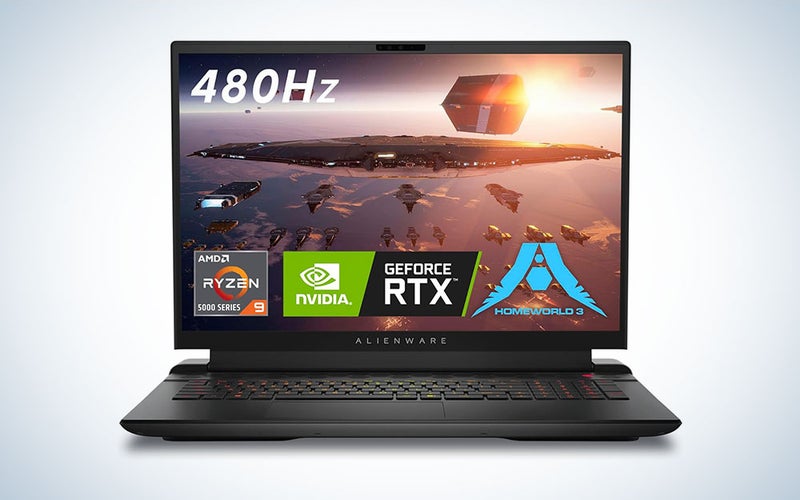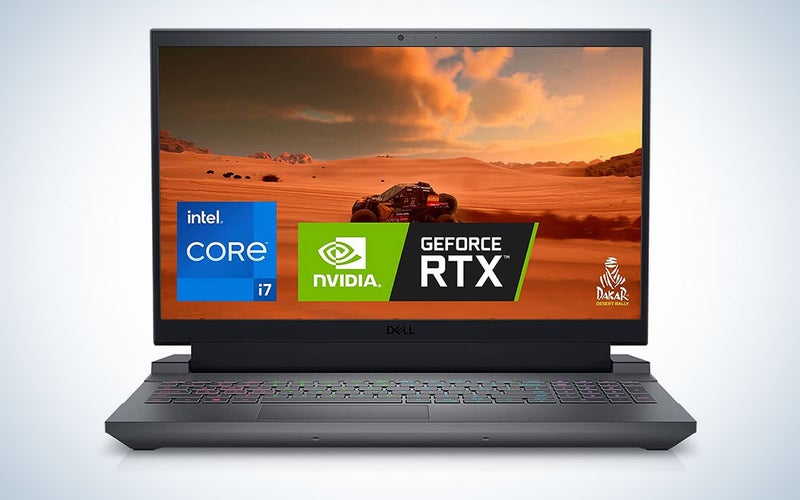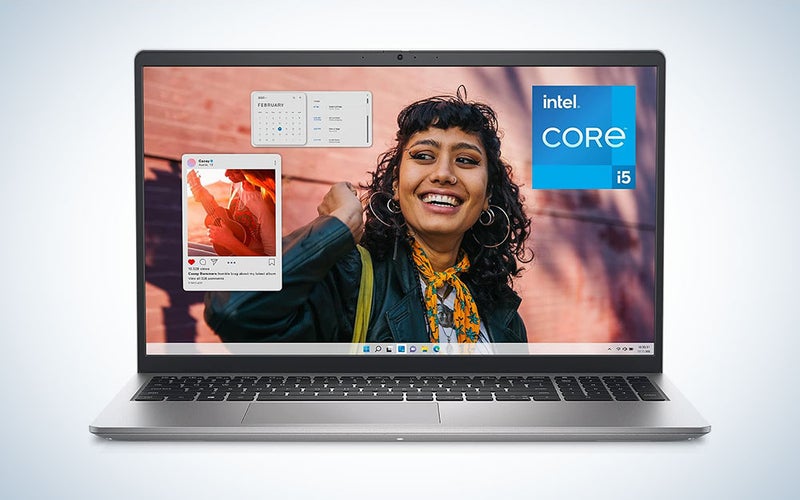We may earn revenue from the products available on this page and participate in affiliate programs. Learn more ›
Dell’s laptop lineup offers options for every computing need, from a kid tackling schoolwork to an engineer designing a plane. In fact, there’s a good chance a school or workplace issued you a Dell at some point, thanks to the company’s reputation for reliable performance, durable builds, and affordability. To pick one for yourself, list how you plan to use it, your budget, and your must-have features, and we’ll help you find one that checks all the boxes. Are you a casual user, a student, a content creator, a gaming enthusiast, or all of the above? This guide will help you check off your must-have features and pick from the best Dell laptops.
- Best overall: Dell XPS 15 9000
- Best for students: Dell Inspiron 14 2-in-1 Laptop
- Best for gaming: Alienware m18 AMD Gaming Laptop
- Best budget gaming: Dell G15 5530 Gaming Laptop
- Best for working from home: Dell-Latitude 15.6″ Laptop
- Best budget: Dell Inspiron 15 3530 Laptop
How we chose the best Dell laptops
There’s not a single Dell laptop that is perfect for everyone. The company’s laptop options range from Chromebooks under $500 to high-powered workhorses that cost thousands, so it helps to understand its leading laptop brands and their most common users. We extensively researched and analyzed this, drawing from a multitude of sources, including our own PopSci reviews, peer recommendations, critical analyses, and user testimonials, to meticulously curate a refined selection for you.
The best Dell laptops: Reviews & Recommendations
Dell’s Inspiron laptops offer wallet-friendly options targeting general computing needs, like streaming videos, emailing, creating social content, and other assorted, more personal computing needs. The XPS line is Dell’s premium line for creative users who need more multitasking power for intensive programs like photo and video editing. Gamers can choose between Dell’s G Series or the LED-lit options of Alienware. Business users, whether small businesses or enterprises, should look at the Latitude, Precision, and Vostro lines that prioritize powerful processors and security. And we’ve got the perfect choice from each of these below.
Best overall: Dell XPS 15 9000
Dell
Specs
- Dimensions: 13.6 x9.1 x 0.71 inches
- Weight: Starts at 4.2 pounds
- OS: Windows 11 Pro
- Processor: Intel i7-13700 (13th generation)
- RAM: 16GB DDR5 SDRAM
- Storage: 512GB SSD
- Graphics: Intel Arc A370M Graphics
- Screen size: 15.6 inches, 1920 x 1200 resolution
- Ports: 2 Thunderbolt 4, 1 USB 3.2 Gen 2 Type-C with DisplayPort, 1 SD card, headphone jack
- Battery life: Up to 18 hours
Pros
- Aluminum body
- Sturdy, elegant design
- Good battery life
- Backlit keyboard
Cons
- 720p web camera
- No USB-A ports
- Pricey
The Dell XPS 15 9000 is an excellent all-around laptop for anyone who wants to do some of everything on an elegant, sleek machine. The XPS series is Dell’s premium line to rival Apple’s M2 series of MacBooks. A longtime favorite of reviewers and consumers, a version ranks as PopSci’s overall pick for best Windows laptop, and it’s one of favorite 15-inch laptops in general.
The XPS 15 is hard to beat for performance, and its well-designed, portable aluminum body weighs just over four pounds. The entry-level XPS starts at $1,600 and is loaded with the latest Intel i7, 16GB of RAM, 512GB of storage, and Intel Arc A370M Graphics. That’s plenty for graphic design, video editing, and some gaming, but it can be configured for more powerful processing and graphics. It can be maxed out to an Intel i9, up to 64GB of RAM, 8TB of storage, and Nvidia GeForce RTX options. The XPS 15 allows two screen options: the full high-definition plus, non-touchscreen option that measures brightness of 500 nits, or an OLED touchscreen of 400 nits. One sore spot is the 720p high-definition webcam, though the video-obsessed may want to upgrade with one of our picks for the best webcams for streaming. The other sore spot is the splurgy price, though deal hunters can still find refurbished models with 12th-generation processors to save some cash.
Best for students: Dell Inspiron 14 2-in-1 Laptop
Dell
Specs
- Dimensions: 12.36 x 8.92 x 0.73 inches
- Weight: Starts at 3.48 pounds
- OS: Windows 11 Home
- Processor: Intel i7-1355U (13th generation)
- RAM: 16GB LPDDR5
- Storage: 1TB M.2 PCIe NVMe SSD
- Graphics: Intel Iris Xe Graphics
- Screen size: 14 inches, 1920 x 1200 resolution
- Ports: 2 Thunderbolt 4, 1 HDMI, 1 USB-A, 1 SD card reader, headphone jack
- Battery life: Up to 11 hours
Pros
- Backlit keyboard
- 1080p front-facing camera
- Fingerprint reader
- Privacy camera
Cons
- Not super bright screen
- A little heavy for form
- Stylus compatible but not included
Sometimes flexibility is what makes a device, and that includes the Dell Inspiron 14 2-in-1 Laptop. Students can use this hybrid machine as a traditional laptop, comfortably typing out long papers, and then set up as a tent for movie-watching to decompress. Scribblers and doodlers can purchase a compatible stylus to use as a tablet thanks to its 360-degree hinges. For about a grand, it includes the latest generation Intel i7 processor and 16GB of RAM, showcasing enough power to be one of PopSci’s best laptops for college and for working from home. It’s suitable for video conferencing and chatting with two mics, a 1080p webcam, and Dolby Atmos speakers (though don’t expect soundbar-level performance). The full high-definition plus screen has a good resolution, but at only 250 nits, it isn’t as bright as others and could be challenging in very sunny rooms.
If you burn through the 2-in-1’s advertised 11 hours of battery life, it has an ExpressCharge feature that will help you reach up to 80% power within an hour. It’s also EPEAT Silver registered and Energy Star rated and ships in 100% sustainable materials.
Best for gaming: Alienware m18 AMD Gaming Laptop
Alienware
Specs
- Dimensions: 16.15 x 12.59 x 1.05 inches
- Weight: 9.32 pounds
- OS: Windows 11 Home
- Processor: AMD Ryzen 9 7845HX
- RAM: 32GB DDR5
- Storage: 1TB M.2 PCIe NVMe SSD
- Graphics: Nvidia GeForce RTX 4080
- Screen size: 18 inches, 1920 x 1200 resolution, 480Hz
- Ports: 3 USB-A 3.2 Gen 1 ports, 1 USB-C 3.2 Gen 1, 2 USB-C 3.2 Gen 2 ports with DisplayPort, 1 RJ45 Ethernet port, 1 HDMI 2.1, 1 headphone jack, 1 power-adapter port, 1 mini-Display port, 1 SD-card slot
- Battery life: Up to 3 hours, 21 minutes
Pros
- Customizable
- Alienware Cryo-tech calling system
- Full numeric pad
Cons
- Very heavy for a laptop
- Poor battery life
- Ports placed in the back
The Alienware m18 AMD Gaming Laptop is a beast in size and power and the top of the line of Dell’s gaming laptops. It offers many different configurations aimed at gaming enthusiasts with the cash to throw into the finer details to ensure blistering speeds and an immersive experience. The base model starts under $2,000—reasonable for a gaming laptop—but quickly climbs as you tack on upgrades to tackle AAA gaming.
The entry model weighs 8.5 pounds and goes up from there depending on-screen options (either 165Hz or 480Hz refresh rates) and processors. We opted for mid-range specs—32GB of RAM, an AMD Ryzen 9 7845HK processor, and a Nvidia GeForce RTX 4080 graphics card—and hit $3,000 and a weight of over nine pounds. Part of the weight is the Cryo-tech cooling system on the CPU and GPU, plus four fans and a vapor chamber to pull heat away from sensitive components. Technically, this machine is a laptop, but it’s clearly aimed at replacing gaming PCs with a smaller format. Laptop ports usually appear on the sides for fast access. On the m18, they line up across the back—snazzily encircled by LED lights no less. That’s the ideal spot to keep desks free of cords connected to a G-sync monitor—but not for a laptop that gets moved around a lot. The three-hour battery life is underwhelming, even for a machine with a heavy workload. For an Alienware laptop, the design is somewhat tame. Still, it has its signature hexagonal grills, programmable lighting zones, and RGB keyboard (unless you want to opt for an ultra-low-profile CherryMX mechanical keyboard).
Best budget gaming: Dell G15 5530 Gaming Laptop
Dell
Specs
- Dimensions: 14.06 x 10.8 x 1.02 inches
- Weight: 5.84 pounds
- OS: Windows 11 Home
- Processor: Intel i7-13650HX (13th generation)
- RAM: 16GB DDR5
- Storage: 1TB M.2 PCIe NVMe SSD
- Graphics: Nvidia GeForce RTX 4060
- Screen size: 15.6 inches, 1920 x 1080 resolution, 165Hz
- Ports: 3 USB-A 3.2 Gen 1 ports, 1 USB-C 3.2 Gen 2 ports with DisplayPort, 1 RJ45 Ethernet port, 1 HDMI 2.1, 1 headphone jack
- Battery life: Up to 6 hours, 31 minutes
Pros
- Customizable
- Backlit keyboard
- Full numeric pad
- Alienware-inspired cooling system
- One-button Game Shift mode activates fans
Cons
- 720p webcam
- Heavy
- Poor battery life
If the Alienware m18 is too much gaming laptop, take a look at the Dell G15 5530 Gaming Laptop, which liberally borrows from its subsidiary’s design but has a price tag of around $1,300. The G15 is better than entry-level, capable of handling AAA gaming thanks to the latest Intel i7 processor, a Nvidia GeForce RTX 4060 graphics card, and a full high-definition screen with a 165Hz refresh rate. Unlike the sleek wedges that dominate laptop shapes, the G15 is a blocky, gray laptop with weird angles around the hinges—what Dell calls a retro design, but we call potentially laptop-bag unfriendly. It also weighs more than six pounds, thanks to an “Alienware-inspired” cooling system with ultra-thin fan blades, four heat pipes, and vents all over the place. It also has a 720 webcam, which is only meh if you plan on live streaming.
Best for working from home: Dell – Latitude 15.6″ Laptop
Dell
Specs
- Dimensions: 14.09 x 9.19 x 0.9 inches
- Weight: 3.56 pounds
- OS: Windows 11 Pro
- Processor: Intel i7-1355U (13th generation)
- RAM: 16GB DDR4
- Storage: 512GB M.2 2230 PCIe NVMe SSD
- Graphics: Intel Iris Xe Graphics
- Screen size: 15.6 inches, 1920 x 1080 resolution
- Ports: 2 Thunderbolt 4 ports with Power Delivery and DisplayPort, 1 USB-A with PowerShare, 1 USB-A 3.2 Gen 1, 1 HDMI 2.0, 1 RJ45 Ethernet, 1 headphone jack, 1 micro-SD card slot, 1 nano-SIM slot, 1 smart card reader slot
- Battery life: Up to 6 hours, 31 minutes
Pros
- Backlit keyboard
- Excellent port selection
- Features to improve video conferencing
Cons
- Plain design
- OK battery life
Despite how powerful gaming laptops can be, they aren’t necessarily the best for working at home. Consider a productivity-focused machine like the Dell – Latitude 15.6″ Laptop. For about $1,200, you can get an Intel i7 processor and 16GB of system memory to crunch through databases, code, or designs. The latest model has larger fans for better heat dispersal. Dell also packs more security and privacy features, like fingerprint readers and “onlooker detection” to alert you when someone’s peeping at your screen, and a sign-in feature that detects your presence and locks the laptop when you leave it. It also has a wide range of ports, from the latest generation of USB-C with display protocols to older USB-A, which many of your older peripherals use.
For improved video conferencing, the latest Latitude models include WiFi 6E and 5G connections for speed and a 1080p webcam with light sensors to enhance the picture and audio tools that help remove background noise and reduce echoes. And while the Latitude is just another average-looking laptop, it passes military standards for durability, so it should safely make it from home to the coffee shop and back again.
Best budget: Dell Inspiron 15 3530 Laptop
Dell
Specs
- Dimensions: 14.11 x 9.27 x 0.67 inches
- Weight: Starts at 3.5 pounds
- OS: Windows 11 Home
- Processor: Intel i5-1335U (13th generation)
- RAM: 16GB DDR4
- Storage: 512GB M.2 PCIe NVMe SSD
- Graphics: Intel Iris Xe Graphics
- Screen size: 15.6 inches, 1920 x 1080 resolution
- Ports: 1 USB-A, 1 USB-C, 1 HDMI 1.4, 1 SD 3.0 card slot, 1 headphone jack
- Battery life: Up to 9 hours, 15 minutes
Pros
- Inexpensive
- Privacy shutter for webcam
- Numerical keypad
Cons
- Plain design
At under $700, the Dell Inspiron 15 3530 Laptop offers a solid computing choice without making as many compromises as a sub-$500 device (though there are models below that price threshold that still perform admirably). It features a 15.6-inch high-definition screen and a roomy keyboard with a numerical keypad. That’s spacious for a laptop that weighs less than four pounds. The webcam is the better 1080p, and it sports two microphones for better video chat sound. It also features the most recent generation of an Intel i5 processor, though it sports fewer cores than the i7. While it’s a plain Jane in the laptop world, it still has ample power for multitasking and most everyday computing tasks.
What to consider when buying the best Dell laptops
The right laptop is the one that does the jobs you need and want to do, all without breaking your budget. Let’s break down the essential factors to consider when hunting for the ideal laptop companion.
Price
Dell’s laptop families target different users and have price points. Dell offers devices under and near the $1,000 mark, including 2-in-1s and traditional laptops that handle most everyday tasks like web browsing, editing documents, and streaming. However, expect to shell out between $1,500 to $2,000 for more robust systems and more than $2,000 for premium options for business and gaming platforms.
Portability
Do you plan on carrying your laptop, or is it a desktop alternative? For the former, look for devices with 13- to 16-inch screens that weigh three to five pounds. Laptops with 17- and 18-inch screens are better suited to staying on a desk or moving only occasionally. Gaming laptops tend to be heavier and bulkier due to their graphic components and cooling systems, though they have slimmed down in recent years.
If you’re on the move, assume you won’t always have a plug available. Many laptops boast about workday-length battery life, though that will depend on the brightness of your screen and what applications you’re running.
Processors, memory, and storage
The central processing unit is what performs computations. It’s hard to go wrong with Intel’s i5, i7, and i9 or AMD’s Ryzen options in Windows laptops. For quick task completion, look for more cores and higher clock speeds (measured in GHz). You don’t need top-of-the-line specs for everyday tasks, but power users, creatives, and gamers should seek out the max and most recent generation within their budgets.
Random access memory grants applications a place to temporarily store data, which means the more you multitask, the more RAM you want. For the lighter side of computing tasks, 8GB of RAM will be acceptable, but jump to 16GB or more if you’re using several applications simultaneously. Manufacturers allow upgrades to RAM prior to purchase but generally can’t upgrade it later. Ditto storage. We recommend 512GB as a starting point but consider 1TB for extensive media and large programs.
About gaming laptops
Gamers face unique considerations for laptops that non-gamers don’t. In a word, it’s speed. The fancier the graphics in a game, the more RAM you’ll want. A safe bet is 16GB, but 32GB is better. You’ll also want the latest processors—13th generation Intel or AMD Ryzen 6000 series—and graphics cards like Nvidia’s 30-series GPUs to display graphics at higher frame rates. How fast the screen can update per second—aka, the refresh rate—also matters. Refresh rates range, but common ones are 60Hz, 144Hz, and 240Hz. We recommend at least 140Hz for AAA gaming. How do you know what you need? Games release minimum systems requirements, so start with your favorites. However, meeting a game’s minimums risks becoming obsolete sooner.
FAQs
Q: Are Dell laptops good laptops?
The company has been a market leader for a reason. Dell offers various laptops, including education-focused budget models, premium competitors (to challenge Apple, Lenovo, HP, etc.), and budget and high-end gaming machines, so take time to find the model that fits your needs best. Dell is known for quality-built hardware and being a good value for the money.
Q: Do Dell laptops last long?
Laptops don’t have an expiration date. However, they generally last three to five years. Their life depends significantly on how much and how hard you use it—and yes, even how carefully you handle it. After all, one spilled drink on a keyboard can deliver an early demise, while some laptops chug on and on until they can’t load a web page. Buying a computer with more processing power and memory can help delay obsolesce.
Q: Is Alienware owned by Dell?
Alienware, known for high-performance gaming hardware, was founded in 1996 and gets its name from its founders’ fondness for the sci-fi series, “The X-Files.” It’s been a subsidiary of Dell since 2006.
Final thoughts on the best Dell laptops
- Best overall: Dell XPS 15 9000
- Best for students: Dell Inspiron 14 2-in-1 Laptop
- Best for gaming: Alienware m18 AMD Gaming Laptop
- Best budget gaming: Dell G15 5530 Gaming Laptop
- Best for working from home: Dell-Latitude 15.6″ Laptop
- Best budget: Dell Inspiron 15 3530 Laptop
The Dell XPS 15 9000 shines as our top choice, offering a blend of sleek design and robust performance. On a budget? The Dell Inspiron 15 3530 Laptop is a solid, cheaper choice under $700, balancing performance and affordability. Students seeking versatility will appreciate the Dell Inspiron 14 2-in-1 Laptop, while professionals working from home should check out the enhanced security features of the Dell-Latitude 15.6″ Laptop. Gaming enthusiasts can match their skills and budget to two options: either the affordable Dell G15 5530 Gaming Laptop or the top-of-the-line Alienware m18 AMD Gaming Laptop.
Why trust us
Popular Science started writing about technology more than 150 years ago. There was no such thing as “gadget writing” when we published our first issue in 1872, but if there was, our mission to demystify the world of innovation for everyday readers means we would have been all over it. Here in the present, PopSci is fully committed to helping readers navigate the increasingly intimidating array of devices on the market right now.
Our writers and editors have combined decades of experience covering and reviewing consumer electronics. We each have our own obsessive specialties—from high-end audio to video games to cameras and beyond—but when we’re reviewing devices outside of our immediate wheelhouses, we do our best to seek out trustworthy voices and opinions to help guide people to the very best recommendations. We know we don’t know everything, but we’re excited to live through the analysis paralysis that internet shopping can spur so readers don’t have to.
